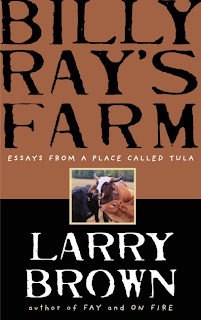
The language is deceptively simple. He only branches off into the wow and flutter in a very measured way. I really like the way he does it. Sometimes it's just country language. It's not real country language, it's shit he made up, like referring to a bulls genitalia as a "calf-maker." It adds color but not at the expense of the tale. I'm going to quote the book twice here to show two other ways he goes about that business.
"I could imagine stinking heaps of bream and carp, maybe bulletheaded behemoths in torn T-shirts standing in them, bloodied, with fishbillies in their hands, the weeps and near-orgasmical moans of grandmaw in a cotton housedress, a big buffalo lodged and wiggling dumbly between her thighs, others wading for help, clubs raised. I could smell the blood and death of it, could see how the sun woudl be shining down on the carnage at nine o' clock in the morning."
The first part is so exaggerated and comical then in the last sentence so Gothic and abrupt. It just ends the run away idea so it can end at all. Here he does the same thing but the feel is comic instead of stark. The grammar is deliberately broken moving the continuity from feeling of a character in control, who has a plan.. then exhibiting doubt, but also awareness of his own folly.
"I approached him slowly, speaking calm words of encouragement. There was a wire gap somewhere along the fence, and it I could just get it open and somehow get behind him without spooking him it might be possible to herd him gently back toward where he belonged, without getting too close to him. I be a man who be afraid of his own bull."
 Linda Yablonsky is a music critic. She's not quite on par with me, but she's much more suave and that's worth something. She also used to be on Smack and you can't beat that real-life experience in writing. Her book "The Story of Junk" is a strangely detached tale of a drug-fiend. While some may recoil at the inhumanity. Sincerity cannot be overrated. I quote a single sentence from a concert review she wrote in another less graphic book: The Show I'll Never Forget.
Linda Yablonsky is a music critic. She's not quite on par with me, but she's much more suave and that's worth something. She also used to be on Smack and you can't beat that real-life experience in writing. Her book "The Story of Junk" is a strangely detached tale of a drug-fiend. While some may recoil at the inhumanity. Sincerity cannot be overrated. I quote a single sentence from a concert review she wrote in another less graphic book: The Show I'll Never Forget.
